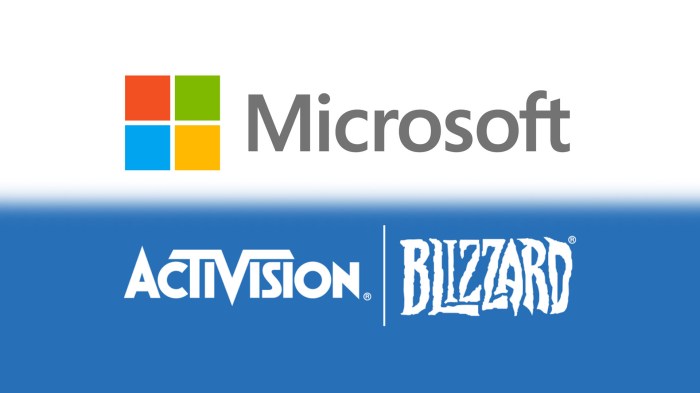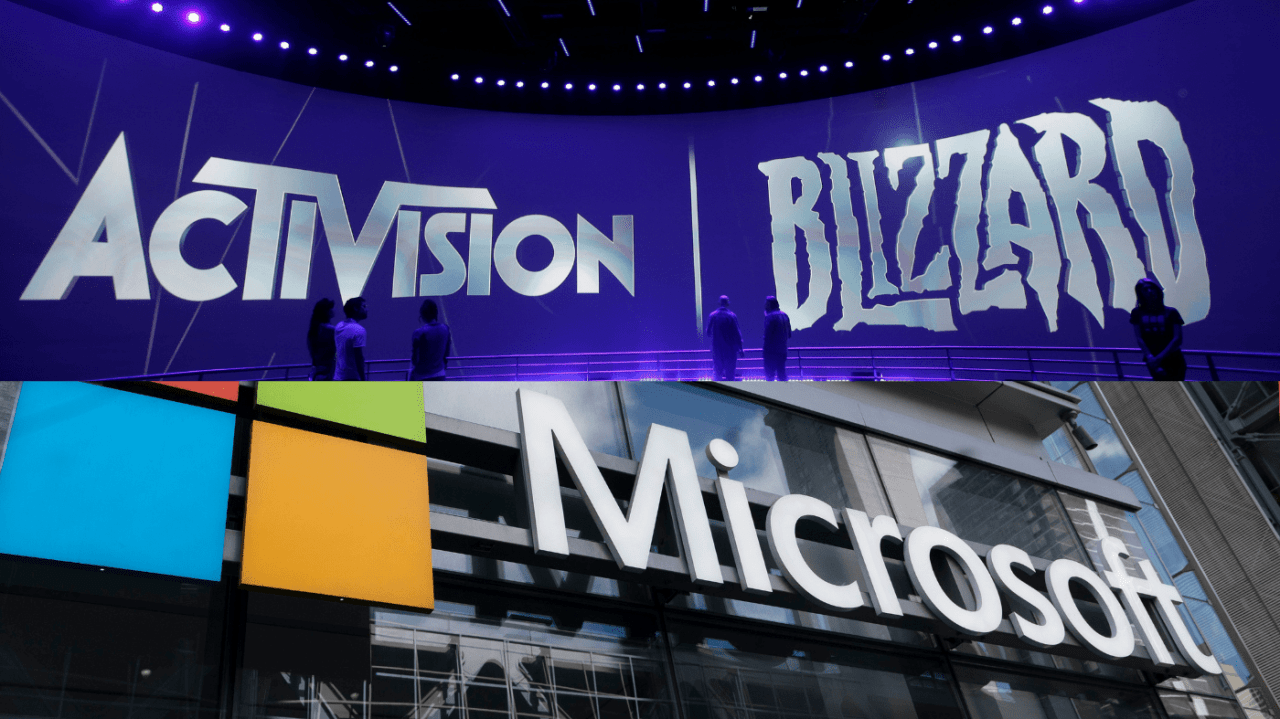Ftc appeal microsoft activision deal acquisition – The FTC appeal of Microsoft’s Activision Blizzard acquisition is raising eyebrows in the gaming industry. This high-stakes legal battle pits the Federal Trade Commission against Microsoft, questioning the potential negative impacts of this major deal. The FTC is arguing that the acquisition will stifle competition and harm consumers, while Microsoft counters that the merger will create innovative opportunities and benefits.
A close look at the competitive landscape, potential economic effects, and legal precedents surrounding this deal is crucial to understanding the potential outcomes.
This in-depth analysis explores the key arguments from both sides, examining the competitive landscape, economic impacts, consumer perspectives, and the potential long-term implications of this landmark antitrust case.
Overview of the FTC Appeal
The Federal Trade Commission (FTC) has filed an appeal challenging the Federal Court’s approval of Microsoft’s acquisition of Activision Blizzard. This appeal marks a significant escalation in the ongoing antitrust debate surrounding the merger, questioning whether the deal will ultimately harm competition in the video game market. The FTC’s arguments center on the potential for reduced innovation and consumer choice if Microsoft gains significant control over the industry.The FTC’s appeal argues that the district court’s decision failed to adequately address the potential anti-competitive effects of the merger.
They maintain that the acquisition will lead to a substantial lessening of competition in the gaming industry, ultimately hurting consumers. Their central argument focuses on the strategic importance of Activision Blizzard’s games and the potential for Microsoft to leverage its market power in the acquisition process.
FTC’s Objections to the Merger
The FTC’s primary concern is that the acquisition will diminish competition within the gaming industry, specifically in the console gaming market. They argue that Microsoft’s control over Call of Duty, a highly popular game franchise, and other Activision Blizzard titles will allow the company to leverage its market position to stifle innovation and limit consumer choices. The FTC believes that Microsoft’s dominance in the console gaming market will be further entrenched, potentially leading to higher prices and reduced game variety for consumers.
Key Arguments Presented by the FTC
The FTC highlights several key arguments in their appeal, emphasizing the following:
- Potential for reduced innovation: The FTC contends that Microsoft’s acquisition of Activision Blizzard could lead to reduced innovation in the gaming industry. Microsoft’s control over popular franchises like Call of Duty could limit the incentives for competitors to develop innovative games and features, potentially stifling competition and creative development.
- Diminished consumer choice: The FTC points to the substantial market share held by Activision Blizzard games and the potential for Microsoft to use its dominant position to limit consumer choice. This includes the potential for excluding competitors’ games from its platform and influencing game development. The FTC emphasizes that reducing consumer choices through this merger is detrimental to a healthy marketplace.
- Exclusionary practices: The FTC argues that Microsoft may employ exclusionary practices to prevent other companies from developing competing games. They cite potential strategies like limiting access to vital platforms or development resources, thus stifling competition.
- Strategic importance of Activision Blizzard games: The FTC stresses the critical role of Activision Blizzard’s games in the gaming market, particularly Call of Duty. They argue that Microsoft’s control over these titles grants significant leverage in influencing future gaming developments and potentially influencing game availability.
Projected Negative Impacts of the Merger
The FTC anticipates several negative consequences of the merger, including:
- Higher prices for consumers: The FTC predicts that with reduced competition, Microsoft may increase prices for games and subscriptions, impacting consumer wallets.
- Reduced game variety: A lack of competition could result in fewer innovative games being developed, limiting choices for gamers.
- Stifled innovation: Microsoft’s control over Activision Blizzard’s resources and expertise might reduce the motivation for competitors to develop new and innovative gaming products.
Legal Precedents and Antitrust Laws
The FTC bases its appeal on established antitrust laws and legal precedents. These include cases where mergers have been deemed anti-competitive and have been blocked or modified. The FTC’s appeal references relevant case law and antitrust statutes, emphasizing how the Microsoft-Activision Blizzard merger could violate existing regulations and principles.
- Clayton Act: The FTC highlights how the acquisition could violate the Clayton Act, which prohibits mergers that substantially lessen competition.
- Relevant court precedents: The FTC cites specific court cases that demonstrate how mergers that limit consumer choice and innovation have been deemed anti-competitive.
Microsoft’s Response to the FTC’s Appeal
Microsoft has vigorously contested the FTC’s appeal of the Activision Blizzard acquisition, presenting a robust defense of the deal’s merits and its projected benefits for the gaming industry. The company emphasizes the significant economic advantages and innovation that the merger will drive, arguing that the FTC’s concerns are misplaced and ultimately harmful to competition.Microsoft’s response highlights a multifaceted approach, challenging the FTC’s factual assertions, and offering concrete solutions to address any potential anti-competitive issues.
Their counterarguments focus on the unique circumstances of the acquisition and its positive impact on consumers.
Counterarguments to the FTC’s Appeal
Microsoft disputes the FTC’s claims regarding the potential for diminished competition in the gaming market. They argue that the FTC’s analysis overlooks the substantial competitive landscape and the evolving nature of the gaming industry. Microsoft’s position rests on the proposition that the acquisition of Activision Blizzard will actually strengthen competition, not weaken it. They emphasize that competitors like Sony and Nintendo remain substantial forces in the market.
Proposed Solutions to Address FTC Concerns
Microsoft has Artikeld specific measures to address the FTC’s concerns. These proposed solutions are designed to ensure fair competition and consumer choice, without hindering the acquisition’s potential to create a dynamic, innovative gaming experience.
- Commitment to Maintaining Competition: Microsoft is committed to ensuring that competition remains robust in the gaming market. This involves a range of measures, including maintaining the independence of existing Activision Blizzard titles and ensuring that future titles do not create unfair advantages to Microsoft’s platform.
- Enhanced Transparency and Regulatory Compliance: Microsoft pledges full transparency in its dealings with the FTC, actively engaging in discussions and providing additional data to allay any concerns. This commitment includes open communication about future business plans related to the acquired assets.
- Clear Separation of Activision Blizzard’s Assets: To demonstrate its commitment to fair competition, Microsoft is prepared to implement measures to ensure clear separation of Activision Blizzard’s assets and operations. This includes maintaining separate business units and distinct development teams, ensuring that no single platform gains an unfair advantage.
Projected Benefits and Advantages of the Acquisition
Microsoft argues that the acquisition of Activision Blizzard offers substantial advantages to consumers and the gaming industry as a whole. The company highlights its plans to leverage the combined resources to develop innovative and engaging gaming experiences.
- Innovation and Growth: The combined resources of Microsoft and Activision Blizzard will fuel innovation, leading to new game development, improved platforms, and enhanced game design. This synergy will enable Microsoft to expand its gaming portfolio, providing new and exciting titles for consumers.
- Expanded Game Library: The acquisition will bring a vast library of popular and critically acclaimed games to the Microsoft gaming ecosystem. This will expand the range of options available to gamers, increasing their choices and satisfaction.
- Improved Platform Capabilities: The integration of Activision Blizzard’s expertise and technology will strengthen Microsoft’s existing platforms, resulting in enhanced gaming experiences for players. This is expected to further solidify Microsoft’s position in the market.
Specific Examples of Projected Benefits
- Cross-platform compatibility and player engagement: The merger may lead to better cross-platform compatibility, increasing player engagement and offering more options for players across various gaming platforms.
- New game development and innovation: The acquisition will allow for a potential increase in new game development and innovation, leading to fresh and engaging experiences for gamers.
- Enhanced cloud gaming capabilities: The acquisition could lead to improved cloud gaming capabilities, providing a broader range of access and flexibility for gamers worldwide.
Competitive Landscape Analysis

The gaming industry is a fiercely competitive market, with a constant influx of new players and innovative approaches. Understanding the competitive landscape is crucial to assessing the potential impact of the Microsoft-Activision Blizzard merger. This analysis will examine major competitors, their market shares, and the possible consequences of increased market concentration.
Major Competitors and Market Shares
The gaming industry boasts a multitude of competitors vying for consumer attention. Recognizing these key players and their relative market positions is essential for understanding the potential implications of the merger.
The FTC’s appeal of the Microsoft Activision deal acquisition is definitely grabbing headlines, but honestly, I’ve been more impressed by something else lately. Samsung’s micro LED smartwatch concept, featured in this article , boasts the brightest screen I’ve ever seen on a watch. It makes me wonder if the tech giants are focusing so much on gaming acquisitions that they’re neglecting truly innovative display technology.
Maybe that’s why the FTC is taking such a strong stance on the Microsoft Activision deal acquisition – are they worried about a lack of competition in the tech space?
- Sony PlayStation: Sony’s PlayStation consoles have historically held a significant market share, consistently competing with Microsoft’s Xbox ecosystem. The success of PlayStation in areas like exclusive game releases and strong community support is noteworthy. Sony’s strong position in the console market influences its gaming ecosystem, making it a direct competitor to Microsoft’s approach.
- Nintendo: Nintendo’s unique approach to gaming, focused on family-friendly titles and innovative hardware, has established a loyal following. While not directly competing in the same market segment as Microsoft and Sony, Nintendo’s presence and influence on the gaming market cannot be overlooked. Nintendo’s focus on unique experiences and dedicated hardware creates a distinct niche.
- Other PC Gaming Companies: A diverse range of PC gaming companies offers a vast array of games and services, including but not limited to Steam, Epic Games Store, and various independent developers. The PC gaming market is a key component of the overall gaming industry, with a large number of gamers choosing PC as their platform of choice.
Potential for Market Concentration and Impact on Consumers
The merging of two major players in the gaming industry could lead to a concentrated market. This could potentially limit consumer choice and increase prices. Historical examples of market consolidation in other industries, such as telecommunications, illustrate the potential for reduced competition. It is essential to analyze the potential implications of reduced competition for consumers and the gaming market as a whole.
Comparison of Microsoft and Activision Blizzard’s Market Share
A direct comparison of the market share of Microsoft and Activision Blizzard in the gaming market requires a precise definition of the market being considered. While Microsoft is a major player in the console market, Activision Blizzard’s influence is primarily concentrated in game development and publishing. Quantitative data on market share varies depending on the specific metrics being used, and this analysis should consider both the console market and the game market.
Understanding how these two companies contribute to the overall market share is critical to evaluate the potential consequences of the merger.
Economic Impacts of the Merger
The proposed merger between Microsoft and Activision Blizzard raises significant questions about its potential impact on the global economy, particularly within the gaming industry. Assessing these impacts requires a nuanced understanding of both the positive and negative consequences, ranging from job creation to potential price increases and market manipulation. The FTC’s appeal underscores the importance of a thorough examination of these economic factors.
Potential Positive Economic Impacts, Ftc appeal microsoft activision deal acquisition
The merger presents potential opportunities for innovation and expansion within the gaming industry. A combined entity might foster cross-platform development, allowing games to reach a wider audience and drive greater revenue. This could potentially lead to job creation in software development, marketing, and other related fields. Increased investment in research and development might spur breakthroughs in game technology, pushing the boundaries of interactive entertainment.
Moreover, the merger could create economies of scale, potentially leading to more affordable game development and distribution.
| Potential Positive Impact | Explanation |
|---|---|
| Job Creation | Increased demand for game developers, marketers, and support staff across multiple platforms. |
| Innovation | Joint research and development could lead to innovative game technologies and improved game experiences. |
| Cross-Platform Compatibility | Simplified access to games across various platforms for a broader user base. |
Potential Negative Economic Impacts
The merger also presents potential downsides. One major concern is the reduction in competition within the gaming industry. A dominant player might be able to manipulate market conditions, leading to higher prices for consumers. This reduction in choice could negatively impact the gaming experience and limit the development of innovative titles from smaller studios. Furthermore, potential anti-competitive practices might arise, hindering the entry of new players into the market and limiting options for consumers.
| Potential Negative Impact | Explanation |
|---|---|
| Reduced Competition | Microsoft’s increased market share could lead to a decline in the variety of game options available. |
| Higher Prices | Reduced competition could result in higher prices for games, impacting consumers’ affordability. |
| Anti-Competitive Practices | Microsoft could implement practices that stifle competition from smaller developers. |
Impact on Game Pricing
Estimating the precise impact on game pricing is complex, requiring consideration of various factors. However, past mergers in similar industries have shown that reduced competition often correlates with price increases. A notable example is the consolidation of the airline industry, which has led to limited choices and potentially higher ticket prices for consumers. The combined market power of Microsoft and Activision Blizzard might lead to similar consequences in the gaming market.
Data on game pricing trends before and after potential mergers would be crucial to evaluate this potential impact.
Long-Term Effects on Gaming Industry Growth
The long-term effects on the gaming industry’s growth remain uncertain. The merger’s outcome could either stimulate innovation and expansion or stifle competition and restrict the industry’s overall progress. Factors such as the FTC’s intervention, the courts’ decision, and the resulting market dynamics will significantly influence the future trajectory of the gaming industry. History provides examples of both positive and negative consequences following mergers in similar sectors, suggesting that the future of the gaming industry hinges on the competitive landscape that emerges after this transaction.
Consumer Perspectives on the Merger
The Microsoft-Activision Blizzard acquisition has ignited a significant debate, with consumers at the heart of the discussion. Understanding the potential impacts on gamers and the broader gaming community is crucial to evaluating the deal’s long-term implications. This section delves into consumer concerns, potential benefits, and varying perspectives across different gaming segments.The acquisition raises numerous questions about future pricing, game availability, and the overall competitive landscape.
Will consumers ultimately benefit from this consolidation, or will it lead to a less diverse and competitive market? Analyzing potential outcomes for various consumer groups is vital to a comprehensive understanding of the merger’s effects.
Potential Consumer Concerns
Consumer concerns regarding the merger primarily revolve around potential anti-competitive practices. The loss of competitive pressure could result in higher prices, reduced innovation, and a diminished selection of games. Players might face limitations in game access or the imposition of exclusive content and services, which could be detrimental to their gaming experience.
Potential Benefits to Consumers
While concerns exist, potential benefits to consumers are also worth considering. A combined platform with extensive resources could lead to more advanced and sophisticated gaming experiences. Enhanced cross-platform compatibility could increase accessibility and user engagement.
Potential Outcomes for Different Segments of the Gaming Community
The impact of the merger will vary significantly across different gaming segments. Casual gamers might experience limited effects, unless pricing strategies change drastically. However, hardcore gamers and esports enthusiasts could face more substantial consequences if game exclusivity or platform restrictions become prevalent.
The FTC’s appeal of the Microsoft Activision deal acquisition is definitely grabbing headlines, but it’s interesting to see how other tech-related news is playing out too. For example, T-Mobile’s T-Vision Live Plus Zone is discontinuing YouTube TV service, which is a bit surprising, given the streaming landscape and the broader trend of mergers and acquisitions. This highlights the ever-changing nature of the tech industry, and perhaps the FTC’s appeal of the Microsoft Activision deal acquisition will have further ripples in this space, similar to the shift with t mobile tvision live plus zone shutting down youtube tv.
It’s a fascinating time to be following these developments.
Potential User Feedback on the Impact of the Acquisition
User feedback on the merger will likely be diverse and complex. Early indications suggest a range of opinions, from concerns about potential exclusivity to excitement about the potential for enhanced experiences. The long-term impact of the merger on user satisfaction will depend on how Microsoft manages the transition and addresses consumer concerns.
Legal and Regulatory Implications

The FTC’s appeal in the Microsoft-Activision Blizzard merger case underscores the crucial role of antitrust laws in shaping the competitive landscape of the tech and gaming industries. This legal challenge highlights the delicate balance between fostering innovation and preventing monopolistic practices. The outcome will have significant implications for future mergers and acquisitions, not only in the gaming sector but across various industries.The appeal probes the potential for anti-competitive behavior by Microsoft, asserting that the acquisition could harm consumers and competitors.
The legal arguments center around concerns about the potential loss of choice and innovation, particularly in the console gaming market. This legal scrutiny scrutinizes the power dynamics between large tech corporations and smaller competitors, and the potential consequences of unchecked consolidation.
Potential Legal Precedents
The FTC’s appeal in this case could establish new legal precedents regarding the treatment of platform acquisitions in the gaming industry. The specific focus on the integration of Activision Blizzard’s games into Microsoft’s ecosystem and its impact on the competitive landscape will likely shape future interpretations of antitrust regulations. The precedent set will affect how regulators approach similar mergers and acquisitions in the future.
The precedent set will be carefully analyzed by industry stakeholders and legal experts to assess the implications for similar cases.
Similar Antitrust Cases and Outcomes
Several previous antitrust cases offer insight into the potential outcomes of the Microsoft-Activision Blizzard appeal. The outcome of this case will be compared with the outcomes of previous mergers, like the AT&T-T-Mobile merger and the proposed merger between Google and Fitbit. These previous cases demonstrate the range of outcomes and the considerations regulators take into account when evaluating the impact of a merger on competition.
- AT&T-T-Mobile merger: This case, while ultimately approved with conditions, exemplifies the scrutiny regulators apply to mergers that could potentially reduce competition in a specific market. The conditions imposed in this case serve as a precedent for the types of restrictions that might be imposed on Microsoft in the Microsoft-Activision Blizzard merger.
- Google-Fitbit merger: This case, which did not proceed, highlights the potential consequences for a merger that was viewed as anti-competitive. This shows that even large companies can face legal challenges if the merger raises concerns about market dominance.
Regulatory Environment Surrounding Mergers and Acquisitions in the Gaming Industry
The gaming industry’s regulatory landscape is dynamic and often evolving. Current regulations are designed to prevent monopolies and promote competition. The specific regulations governing mergers and acquisitions in the gaming industry are largely based on general antitrust laws, rather than industry-specific rules. This means the courts and regulatory bodies have to assess the impact of the proposed merger on competition in the broader market.
The FTC’s appeal of the Microsoft-Activision deal highlights antitrust concerns, but it’s also got me thinking about the absurdity of things like fake restaurant listings on Seamless. These listings, often designed to trick customers or promote other businesses, raise similar questions of market manipulation, though on a much smaller scale. Are these tactics impacting consumer choice? Ultimately, the FTC’s focus on preventing anti-competitive practices in the video game industry through this appeal, seems like a much larger, and more important issue.
seamless fake restaurant listings nyc are a clear example of how misleading practices can occur, but this FTC appeal shows a similar struggle to maintain fair play and prevent market distortions.
Potential Implications of the Ruling on Future Mergers and Acquisitions
The ruling in the Microsoft-Activision Blizzard case will have far-reaching implications for future mergers and acquisitions, especially in the tech and gaming sectors. The decision will affect how regulators evaluate platform acquisitions, the extent to which integration of game libraries is considered anti-competitive, and the role of market dominance in assessing mergers. This ruling will be closely followed by industry experts, investors, and regulators alike.
Potential Outcomes and Future Implications
The FTC’s appeal of the Microsoft-Activision Blizzard merger raises significant questions about the future of the gaming industry and the interpretation of antitrust law. This crucial legal battle could set a precedent for future mega-mergers in the tech sector, impacting not just the gaming world, but also broader economic landscapes. The outcome will have profound consequences for both companies, consumers, and the competitive landscape of the industry.
Potential Outcomes of the FTC Appeal
The FTC appeal carries several potential outcomes, each with far-reaching implications. The court’s decision will dictate the fate of this significant merger, potentially influencing future consolidation attempts in the tech sector.
- FTC Appeal Success: The FTC could prevail in its appeal, leading to a rejection of the merger. This would be a major setback for Microsoft, potentially jeopardizing its ambitious plans for expanding its gaming dominance. The implications would ripple through the industry, potentially impacting other acquisitions and influencing the strategic direction of gaming companies. The rejection could also encourage a more cautious approach to mergers and acquisitions in the future.
- Microsoft Appeal Success: Conversely, Microsoft could succeed in its defense, potentially leading to the approval of the merger. This outcome would solidify Microsoft’s position in the gaming market, possibly leading to increased innovation and competition in the market. The long-term consequences of this victory are significant, impacting the entire industry’s direction and competitive dynamics.
- Modified Merger Approval: A less definitive outcome could involve a modified approval of the merger. This scenario would likely involve conditions or restrictions imposed on Microsoft to mitigate antitrust concerns. For instance, the court might require Microsoft to divest certain assets or services to ensure fair competition. This scenario would represent a compromise, navigating the conflicting interests of the parties involved.
Consequences of Different Scenarios
The table below summarizes potential outcomes and their likely consequences:
| Scenario | Consequences for Microsoft | Consequences for Activision Blizzard | Consequences for Consumers | Consequences for the Gaming Industry |
|---|---|---|---|---|
| FTC Appeal Success (Rejection) | Significant financial loss, setback for expansion plans, potential loss of market share. | Loss of potential merger benefits, potential impact on company strategy. | Potentially maintain a more competitive gaming landscape, increased choice of gaming platforms. | Could lead to a more fragmented gaming landscape, possibly impacting future innovation. |
| Microsoft Appeal Success (Approval) | Significant market share gain, strengthened gaming platform, potentially increased profitability. | Integration into Microsoft’s platform, increased revenue streams, and potential for new opportunities. | Potentially less competitive gaming landscape, limited choices. | Increased consolidation, potentially impacting smaller developers and independent studios. |
| Modified Merger Approval | Acceptance of conditions to address antitrust concerns, but potentially less significant market impact compared to full approval. | Integration with Microsoft’s platform with restrictions, potentially limited scope of operations. | Maintains some degree of competition, but with conditions that might restrict choices. | Potentially mitigates the negative effects of full approval, but may still impact smaller companies. |
Significance for Antitrust Law
This case carries significant implications for antitrust law. The outcome will shape how regulators approach future mergers, particularly in the technology sector. The court’s decision will set a precedent for evaluating potential anti-competitive effects in the gaming industry and other sectors with interconnected ecosystems. A rejection of the merger could signal a stronger regulatory stance against potentially harmful consolidations.
“The outcome will undoubtedly influence the future interpretation and application of antitrust laws, setting a precedent for future cases involving similar issues.”
Future Direction of the Gaming Industry
The outcome of the appeal will have a direct impact on the future direction of the gaming industry. A successful appeal could create a more competitive environment with fewer dominant players. Conversely, approval could result in further consolidation, potentially impacting smaller developers and independent studios. Ultimately, the future of gaming will depend on how the court balances the need for competition with the potential for innovation and market expansion.
Historical Context
The Microsoft-Activision Blizzard merger, a monumental deal in the gaming industry, is not without precedent. Analyzing past mergers and acquisitions in the tech sector, particularly those involving dominant companies and potentially anti-competitive practices, provides crucial context for understanding the current legal battle. This historical lens illuminates evolving antitrust concerns, highlighting how the tech landscape has shifted and how past decisions might shape the future of this case.
Historical Precedents of Similar Mergers
Past mergers, though not identical to the Microsoft-Activision Blizzard case, offer important comparisons. For example, the AT&T-T-Mobile merger faced significant scrutiny from regulators concerned about the potential for reduced competition in the telecommunications market. Similarly, the proposed merger of Time Warner and AOL in the early 2000s raised antitrust concerns, particularly regarding the combined market power of these companies in the internet and media space.
These examples highlight a recurring theme: the scrutiny of mergers involving companies with substantial market share, where the potential for reduced competition is a primary concern.
Evolution of the Tech Industry
The tech industry has undergone remarkable transformation over the past few decades. The rise of the internet and the subsequent emergence of software, cloud computing, and mobile gaming have created new markets and challenges for regulators. Early cases often focused on traditional industries, while modern cases need to adapt to the nuances of the digital economy, where network effects, data dominance, and the interconnectedness of platforms play a significant role.
This shift necessitates a more nuanced approach to antitrust analysis, as the tools and precedents from previous eras may not always perfectly apply.
Trends in Antitrust Cases
Analyzing past antitrust cases reveals recurring trends. A key pattern involves the growing recognition of the importance of “network effects.” These effects, where the value of a product or service increases as more users adopt it, can create substantial barriers to entry for competitors. This trend is especially apparent in the digital economy. Additionally, the increasing dominance of a few major players in certain sectors has led to greater scrutiny of potential anti-competitive behavior.
Furthermore, the evolution of digital platforms and the increasing interconnectedness of various industries are factors that regulators are increasingly considering when evaluating mergers.
Impact of Industry Evolution on the Current Situation
The evolution of the tech industry, characterized by the rise of platforms, cloud computing, and mobile gaming, has profoundly shaped the current Microsoft-Activision Blizzard merger review. The merger’s potential implications for the competitive landscape in these rapidly evolving areas are a major focus. The interplay of network effects, platform dominance, and the interconnectedness of digital services are crucial factors in the FTC’s analysis.
Ultimate Conclusion: Ftc Appeal Microsoft Activision Deal Acquisition
The FTC appeal surrounding the Microsoft-Activision Blizzard acquisition is a significant moment in the gaming industry. The outcome will undoubtedly shape the future of competition and innovation within the sector. Whether the FTC succeeds in blocking the merger or Microsoft prevails remains to be seen. This case sets a precedent for future mergers and acquisitions, impacting the entire tech industry and potentially leading to significant shifts in the competitive landscape.






